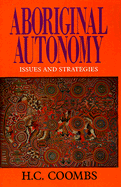Book contents
- Frontmatter
- Contents
- Foreword by Michael Dodson
- Preface
- Acknowledgments
- The Aboriginal World View
- Aborigines and the Land
- Aboriginal Lifestyles
- Aborigines, Resources and Development
- Aborigines, Law and the State
- Asserting Autonomy: Recent Aboriginal Initiatives
- 14 Aboriginal initiatives on the land
- 15 Initiatives in Aboriginal political organisation
- 16 Education: taking control
- The Recognition of Native Title
- Conclusion
- Appendix: The Eva Valley Statement
- References
- Select Bibliography of work by H.C. Coombs
- Index
14 - Aboriginal initiatives on the land
Published online by Cambridge University Press: 03 May 2011
- Frontmatter
- Contents
- Foreword by Michael Dodson
- Preface
- Acknowledgments
- The Aboriginal World View
- Aborigines and the Land
- Aboriginal Lifestyles
- Aborigines, Resources and Development
- Aborigines, Law and the State
- Asserting Autonomy: Recent Aboriginal Initiatives
- 14 Aboriginal initiatives on the land
- 15 Initiatives in Aboriginal political organisation
- 16 Education: taking control
- The Recognition of Native Title
- Conclusion
- Appendix: The Eva Valley Statement
- References
- Select Bibliography of work by H.C. Coombs
- Index
Summary
The anthropologist W E H Stanner has argued that ever since it became apparent that Europeans were here to stay and that Aborigines lacked the fire power to prevent them, Aborigines have had a conscious agenda directed at a ‘composition’ with the invaders. There was then no way that this agenda could be articulated as a basis for negotiation and in any case, the fire power was generally in the hands of an enemy interested only in final solutions. However after killing, disease and starvation had eliminated major resistance, the needs of the pastoralists made it possible for the Aboriginal agenda for a composition to be expressed increasingly in Aboriginal actions – in what they did and what they refrained from doing.
In this chapter I draw attention to some instances of Aboriginal initiative and innovation which provide information about the Aboriginal agenda for the achievement of such a composition. It is only when white society becomes aware of that agenda and its purposes that reconciliation can become a meaningful objective. There could be many instances which would serve that purpose. Those which I have chosen are instances where their character and their compatibility have to some extent become clear. They are also ones in which I personally have been involved. This is not to suggest that my involvement was especially significant, but that it ensured that my account of the instances is based to a greater or lesser degree on personal observation.
- Type
- Chapter
- Information
- Aboriginal AutonomyIssues and Strategies, pp. 156 - 170Publisher: Cambridge University PressPrint publication year: 1994



